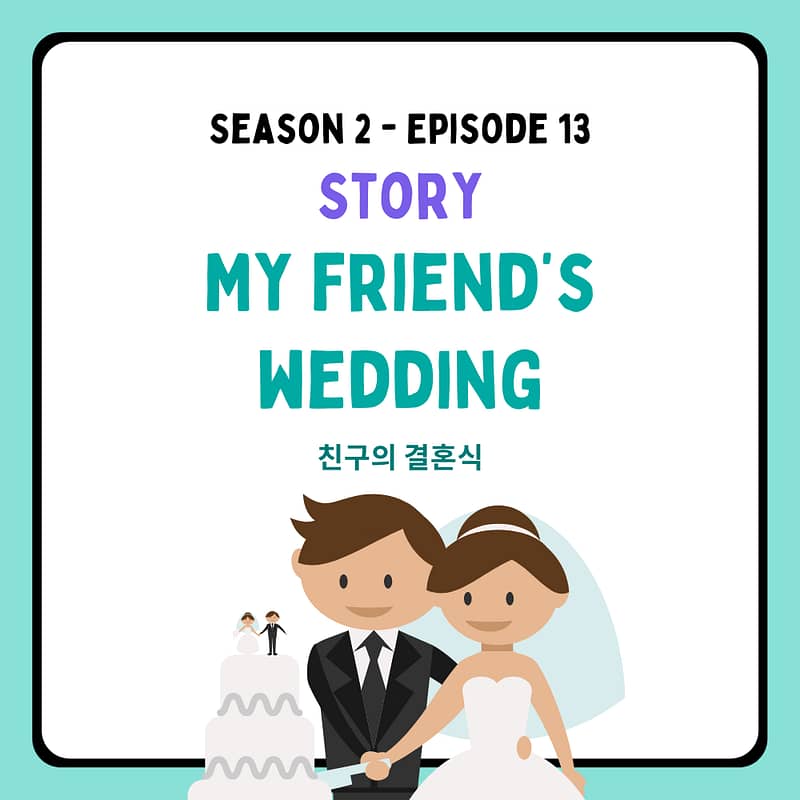Powered by RedCircle
시즌2, 13화. 이야기편 | 내 친구의 결혼식
Season 2, Episode 13 – Story | My friend’s wedding
안녕하세요? 잘 지냈어요? It’s your host of Korean study café, Vanessa.
Today we will listen to a story written by a friend whose friend is soon-to-be-married.
Then now, shall we listen to the story?
Script
오늘 드디어 제 친구에게 청첩장을 받았어요. 그 친구는 한달 뒤에 결혼을 할 거예요. 사실 그 친구는 6개월 전에 남자친구에게 청혼을 받았어요. 그래서 저는 이미 이 사실을 알았어요.
지난 달에는 그 친구가 결혼식에 입을 웨딩 드레스와 한복을 저와 같이 골랐어요. 드레스를 입은 친구는 정말 예뻤어요. 그 친구는 아주 행복해 보였어요.
한국에서는 보통 결혼하는 친구를 위해 축의금을 줘요. 결혼하는 사람들은 이 축의금으로 결혼식과 신혼 여행을 준비해요. 그래서 저는 친구를 많이 축하해주고 싶어서 축의금을 많이 준비했어요. 친구가 남편과 행복하게 잘 살길 바래요.
Translation
Today I finally got a wedding invitation from my friend. My friend is getting married a month later. In fact, my friend got a proposal from her boyfriend six months ago. So I already knew this. Last month, my friend and I chose her wedding dress and Hanbok for her wedding. The friend looked beautiful in the dress. The friend seemed very happy.
In Korea, they usually give congratulatory money to friends who are getting married. Married people use this gift to prepare for their wedding and honeymoon. So, I wanted to congratulate my friends quite a bit, so I prepared huge congratulatory money. I want my friend to live happily with her husband.
How was it? Were you able to understand most of the parts? Even if you didn’t, it’s totally fine because we will see the meaning together now.
All right, then, Now let’s break down some valuable expressions together.
오늘 드디어 제 친구에게 청첩장을 받았어요. 그 친구는 한달 뒤에 결혼을 할 거예요. 사실 그 친구는 6개월 전에 남자친구에게 청혼을 받았어요. 그래서 저는 이미 이 사실을 알았어요.
So basically, this story starts from when the woman got a wedding invitation 청첩장. Yes. 청첩장 means wedding invitation. So 오늘 드디어 제 친구에게 청첩장을 받았어요 means “Today I finally got a wedding invitation from my friend.” Also, the speaker said 그 친구는 한달 뒤에 결혼을 할 거예요 My friend will be married in a month.
You might think that this is too short a time. Well, but it’s ordinary in Korea. Before sending a wedding invitation, the couple let know everyone who will be invited to the wedding much in advance. So receiving a wedding invitation from the couple 1 or 2 months earlier is not something weird in Korea.
Also, the speaker said 그 친구는 6개월 전에 남자친구에게 청혼을 받았어요 the friend got proposed to her boyfriend six months ago.
Well, the marriage proposal culture is also very different in Korea. In western cultures, a proposal is where the boyfriend asks his girlfriend to marry officially for the first time.
But in Korea, some couples may follow western cultures, but mostly not. In Korea, a proposal is more of an event between a couple.
After they decide to get married, and couple selects a wedding date and prepares venues and more. Once most things are set for the wedding, the future groom does a proposal event for the future bride. It’s pretty different, huh?
There is a saying in newly wedded couples, as we are dating, we talk about marriage, and when we talk about marriage, we see each other’s families, and then we see the wedding hall.
It’s interesting, right?
Okay, then now let’ hear the next part.
지난 달에는 그 친구가 결혼식에 입을 웨딩 드레스와 한복을 저와 같이 골랐어요. 드레스를 입은 친구는 정말 예뻤어요. 그 친구는 아주 행복해 보였어요.
The speaker said her friend chose her wedding dress 웨딩 드레스 and 한복 Hanbok, Korean traditional clothes that she will wear at the wedding. There are two parts to Korean weddings. The first part is with an officiant(or pastor), and then there’s the second part. We call it as 폐백 Pyebaek. It’s a traditional Korean style of wedding.
In Pyebaek, people skip the officiant part, and the couple’s parents share well-wishing remarks for the newly married couple. So the couple should change their gowns to Hanbok for this part. That’s why people choose Hanbok as well, along with a wedding dress and tuxedo. In western culture, it’s common to buy or alter wedding dresses, but in Korea, we rent the dress and Hanbok. So the speaker said “to choose” 고르다 instead of saying “to buy” 사다.
And then the speaker said 드레스를 입은 친구는 정말 예뻤어요 My friend who wore the dress was gorgeous.
In English, a sentence is connected with a sub-sentence using that, who, where, and so on. A woman who wears a dress, A person that gets married, and so on. In Korean, we convert verbs to function as noun modifiers. For example, A woman who wears a dress 드레스를 입는 여자, A person that gets married 결혼하는 여자.
If sub-sentences are in the present tense, the verb parts should end with 는, while in the future tense, the verb parts should end with ㄹ or 을. If it’s in the past tense, then the verb parts end with ㄴ or 은.
Present tense verbs / -는
i.e.) 가다(to go) – 가는, 먹다(to eat) – 먹는, 입다(to wear) – 입는, 결혼하다(to get married) – 결혼하는
Past tense verbs / -ㄴ, -은
-ㄴ : if the verb stem is ending with a NO final consonant(받침)
i.e.) 가다(to go) – 간, 결혼하다(to get married) – 결혼한
-은 : if the verb stem is ending with a final consonant(받침)
i.e.) 먹다(to eat) – 먹은, 입다(to wear) – 입은
Future tense verbs / -ㄹ, -을
-ㄹ : if the verb stem is ending with a NO final consonant(받침)
i.e.) 가다(to go) – 갈, 결혼하다(to get married) – 결혼할
-을 : if the verb stem is ending with a final consonant(받침)
i.e.) 먹다(to eat) – 먹을, 입다(to wear) – 입을
I will explain this part more in detail on our website, so go and check this out.
So the sentence that we just heard 드레스를 입은 친구는 정말 예뻤어요 means “My friend who wore the dress was gorgeous.”
Did you hear that part? 드레스를 입은 친구 the friend who wore the dress.
So now you can understand how to say this kind of expression, right?
All right. Then now, let’s listen to the last part.
한국에서는 보통 결혼하는 친구를 위해 축의금을 줘요. 결혼하는 사람들은 이 축의금으로 결혼식과 신혼 여행을 준비해요. 그래서 저는 친구를 많이 축하해주고 싶어서 축의금을 많이 준비했어요. 친구가 남편과 행복하게 잘 살길 바래요.
한국에서는 보통 결혼하는 친구를 위해 축의금을 줘요. You might not understand what this means if you don’t know what 축의금 is. 축의금 is congratulatory money.
Instead of giving a gift for the friend who is getting married, Korean people give congratulatory money that is used for the preparation of wedding ceremony 결혼식 and honeymoon 신혼 여행. So if you get invited to a Korean wedding, then you don’t have to worry about preparing gifts.
Instead, on the wedding day, you can bring some amount of money in an envelope written with your name on it, and you give the money envelope to your friend’s booth. There’s always a person or two who receive the congratulatory money. The amount of this 축의금 can vary much depending on how much you are close to the friend. So as the speaker said, 저는 친구를 많이 축하해주고 싶어서 축의금을 많이 준비했어요 I wanted to congrats my friend a lot, so I prepared much money, this part now might make sense to you.
And lastly, the speaker ends the story by saying 친구가 남편과 행복하게 살길 바래요 I hope my friend will live happily with her husband.
That’s so sweet of her, right?
Well, so we’ve heard a story about a person whose friend is getting married soon. So we learn a lot of different wedding cultures in Korea.
How was it? If you have any further questions about Korean wedding cultures, please let me know. You can leave a comment on our social media or website. I will be happy to answer your questions.
All right. 그럼 오늘은 여기까지 설명을 마칠게요. Then this is it for today!





